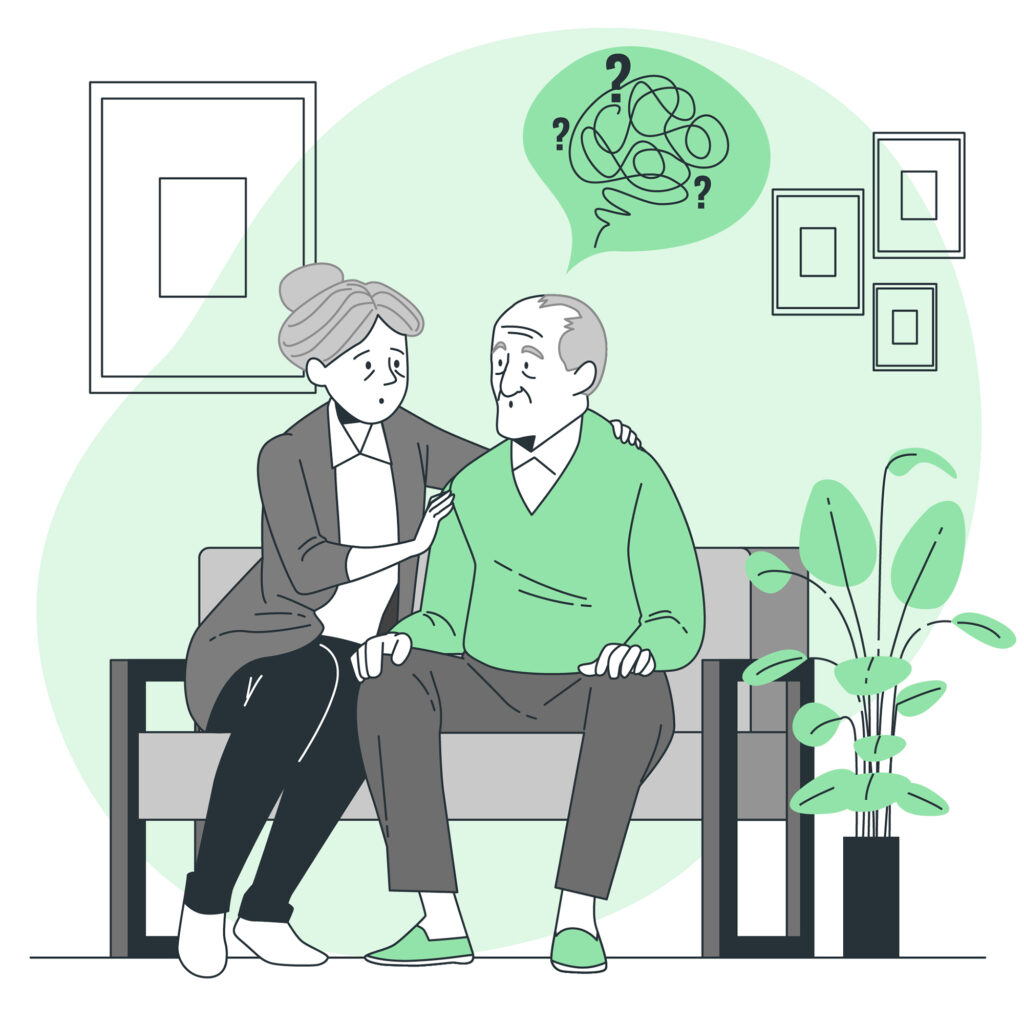We all have parents who are getting old, we also have many of our loved ones in the middle
ages moving forward to old-age and some already in it. It usually starts subtly, a misplaced key,
forgetting recent conversations, or struggling to recall a familiar name. At first it may seem like
harmless forgetfulness, an effect of stress , something we all experience. But for millions
worldwide, these early signs mark the beginning of something far more profound–Alzhiemer’s.
Understanding Alzheimer’s Disease
Alzheimer’s disease is the most insignificant and average type of dementia, a progressive
neurological disorder that slowly works to destroy memory, cognitive skills, and even the ability
to carry out mundane tasks. Named after Dr. Alois Alzheimer, who first prescribed it in 1906,
this condition majorly affects older adults, though early-onset cases can occur as early as one’s
40’s or 50s.
It’s not just memory that fades, emotions, relationships, and independence are all deeply
impacted.
The Brain Under Attack
Alzheimer’s disease occurs when abnormal protein deposits known as amyloid plaques and tau
tangles, accumulate in the brain. These disrupt communication between the nerve cells and
eventually lead to brain cell death. As the brain shrinks and deteriorates, essential mental
functions like reasoning, behaviour, and personality begin to decline.
Some may only remember a particular timeline and face difficulty being in the present.
Early Signs and Symptoms of Alzheimer’s
While memory loss is the hallmark symptom, Alzheimer’s is much more than forgetfulness.
Recognising the early symptoms can help in seeking early intervention:
● Memory loss that disrupts daily life (forgetting dates or events, asking for the same
information repeatedly)
● Difficulty planning or solving problems
● Confusion with time or place
● Trouble understanding spatial relationships or visual images
● Problems with speaking or writing
● Misplacing things and inability to retrace steps
● Poor judgment and decision-making
● Withdrawal from social activities
● Changes in mood and personality
Often, family members notice the symptoms first. A person with Alzheimer’s may dismiss their
forgetfulness or hide it, making it even harder to detect.
Who is at Risk?
Alzheimer’s doesn’t have a single cause. It’s a complex interplay of genetic, environmental, and
lifestyle factors.
Risk factors include:
● Age: Most people with Alzheimer’s are 65 or older.
● Family History: Having a parent or sibling with Alzheimer’s increases your risk.
● Genetics: The presence of certain genes (like APOE-e4) may raise susceptibility.
● Head Trauma: A history of serious head injuries.
● Heart Health: Conditions like high blood pressure, obesity, and diabetes can increase
risk.
● Lifestyle Choices: Sedentary behaviour, smoking, poor diet, and lack of mental
stimulation can contribute.
Diagnosis and Screening
There is no single test to confirm Alzheimer’s. Instead doctor’s rely on a combination of
methods:
● Medical History review
● Cognitive and neuropsychological tests
● Brain imaging (MRI, CT, PET scans)
● Blood tests to rule out other causes
In recent years, biomarker testing and spinal fluid analysis have emerged as promising tools to
detect early-stage Alzheimer’s, even before the symptoms appear.
Can Alzheimer’s Be Cured?
Currently, there is no cure for Alzheimer’s. However, recent years have brought hopeful
breakthroughs in slowing its progression and improving quality of life.
FDA-Approved Medications
● Donepezil, Rivastigmine, and Galantamine: Help with memory and cognition in early
to moderate stages.
● Memantine: Supports brain function in moderate to severe stages.
● Lecanemab and Aducanumab : Target amyloid plaques directly and have shown
potential in early Alzheimer’s.
Lifestyle Management and Alzheimer’s Prevention

While we can’t completely prevent Alzheimer’s, mounting evidence suggests we can reduce the
risk or delay its onset with the right lifestyle choices.
- Eat a Brain-Healthy Diet Eat a brain-healthy diet
The Mediterranean and MIND diets have shown great promise in protecting against cognitive
decline. These diets emphasize :
● Leafy green vegetables
● Berries (especially blueberries)
● Whole grains
● Fish rich in omega-3 (like salmon)
● Olive oil
● Nuts and legumes, avoiding processed foods, excess sugar, and saturated fats is key. - Exercise Regularly
Physical activity improves blood flow to the brain and encourages the growth of new neurons.
Aim for:
● 150 minutes of moderate aerobics activity per week
● Strength training at least twice weekly
● Even simple activities like daily walking, yoga, or dancing can help - Stimulate Your Mind
Keeping your brain active may help build cognitive reserve, which delays the onset of
symptoms:
● Learn a new language or instrument
● Solve puzzles or play memory games
● Read regularly and engage in lifelong learning - Stay Socially Connected
Loneliness and isolation increase the risk of cognitive decline. Maintain strong relationships
with:
● Family, friends, and community
● Volunteering oe joining hobby groups
● Participating in cultural and religious events
- Protect Your Heart to Protect Your Brain
Conditions like hypertension, diabetes, and high cholesterol are closely linked to dementia. A
healthy heart means a healthy brain.
Caring for a Loved One with Alzheimer’s Caring for someone with Alzheimer’s can be emotionally and physically draining. Over time, the individual may lose the ability to recognize loved ones, speak clearly, or manage daily tasks.
Caregiving Tips:
● Establish routines to reduce confusion
● Label items and use reminders
● Simplify communication (Short sentences, calm tone)
● Ensure Safety ( remove tripping hazards, install locks)
● Seek support through caregiver groups or counseling
● Take breaks and consider respite care services
Current Research and Progress
Exciting advances are underway in Alzheimer’s research. In recent years there have been
clinical trials in gene therapy, vaccines, and monoclonal antibodies that show promise in
changing the course of the disease. Researchers are also exploring links between the gut
microbiome and brain health, opening up entirely new prevention possibilities.
Frequently Asked Questions (FAQs)
Q: Is Alzheimer’s the same as dementia?
A: No, Dementia is an umbrella term for memory loss and cognitive issues. Alzheimer’s is the
most common form of dementia.
Q: At what age can Alzheimer’s start?
A: While most people are diagnosed after 65, early-onset Alzheimer’s can begin as early as
age 40.
Q: Is memory loss always a sign of Alzheimer’s?
A: No, stress, lack of sleep, depression, and normal aging can all affect memory. Persistent or
worsening memory problems should be evaluated.
Q: Can Alzheimer’s be prevented?
A: While not entirely preventable, healthy lifestyle choices can greatly reduce the risk and
delay its progression.
Q: How long can a person live with Alzheimer’s?
A: On average, a person lives 4 to 8 years after diagnosis, but some may live as long as 20
years, depending on overall health and care.
Living with Compassion and Awareness
It is a heart-breaking disease, not just for those diagnosed but for the families who walk the
journey with them. Yet there’s hope through understanding, support and continued scientific
research. By recognising early signs , making lifestyle changes, and fostering compassion in our
communities, we can make a meaningful difference

